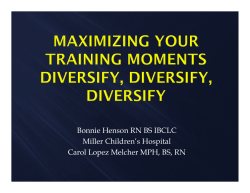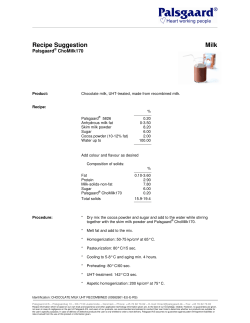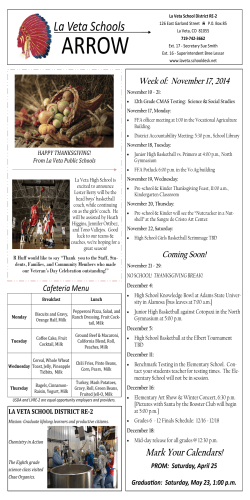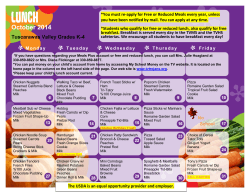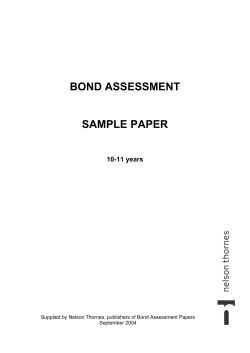
Functional Foods and Exercise Recovery
FACULTY OF HEALTH & LIFE SCIENCES Functional Foods and Exercise Recovery Dr Emma Stevenson Faculty of Health and Life Sciences, Northumbria University, Newcastle upon Tyne, UK. FACULTY OF HEALTH & LIFE SCIENCES Muscle glycogen resynthesis Rehydration Muscle protein synthesis Immune response Appetite Recovery EIMD and soreness Sleep Cognitive functioning FACULTY OF HEALTH & LIFE SCIENCES Why are recovery strategies important? • Manage the negative effects of exercise • Faster return to training • Maintain back-to-back performance in competition and training FACULTY OF HEALTH & LIFE SCIENCES Functional foods • Foods that deliver enhanced benefits over and above their basic nutritional value • Some focused around a particular functional ingredient • Global market: ~$177 Billion with an annual growth: ~7-8% • Public demand for non-pharmacological interventions • Athletes opting for natural solutions – influenced by NGB, EIS, WADA FACULTY OF HEALTH & LIFE SCIENCES Functional food research activity 7000 6388 6000 5434 5063 Number of publications 5000 4450 3978 4000 3362 3102 3000 2000 1554 1529 1570 2003 2004 2005 1325 1050 1092 2000 2001 1730 1000 188 354 0 1980 1990 2002 2006 Year WoK search for “functional food” 2014 2007 2008 2009 2010 2011 2012 2013 FACULTY OF HEALTH & LIFE SCIENCES Functional foods and recovery FACULTY OF HEALTH & LIFE SCIENCES Milk FACULTY OF HEALTH & LIFE SCIENCES Functional applications of milk • Exercise recovery - Muscle repair, growth and adaptation - Glycogen resynthesis and exercise capacity - Rehydration - Attenuation of exercise induced muscle damage (EIMD) • Bone health • Body composition • Appetite control FACULTY OF HEALTH & LIFE SCIENCES Recovery from resistance exercise • ‘Fast proteins’ e.g. Soy and whey – rapidly digested and transient rise in AA large stimulate protein synthesis • ‘Slow proteins’ e.g. Casein – more prolonged digestion longer lasting rise in AA suppresses proteolysis • To promote an anabolic environment for muscle protein synthesis after resistance exercise, a combination of fast and slow proteins is advantageous • Milk ~ 80% casein and ~ 20% whey FACULTY OF HEALTH & LIFE SCIENCES Amino acid profiles Burke et al., (2012) Int J Sports Nutr Ex Met FACULTY OF HEALTH & LIFE SCIENCES Milk and recovery: Acute response • Wilkinson et al. (2007) - 8 healthy males (regular resistance exercise) - 500ml of either skimmed milk or soy beverage following a resistance exercise bout (unilateral leg exercise) FACULTY OF HEALTH & LIFE SCIENCES Milk and recovery: chronic studies • Hartman et al. (2007) - Young active men trained 5 d/wk for 12wk - Consumed 500ml skimmed milk, soy or CHO control immediately and 1 h post-exercise - Greater hypertrophy and greater fat mass loss in milk group • Josse et al. (2010) - Same protocol in recreationally active women (milk versus CHO) - Greater muscle mass accretion, strength gains and fat mass loss in milk group FACULTY OF HEALTH & LIFE SCIENCES Recovery from endurance exercise • Several studies have reported improved endurance capacity following milk-based recovery products (Thomas et al. 2009, Ferguson-Stegall et al. 2011) • No differences in muscle glycogen resynthesis over a 4h recovery period (Ferguson-Stegall et al. 2011) • Milk-based drinks more effective in modulating the activation of key intracellular signalling proteins involved in protein synthesis during recovery (Ferguson-Stegall et al. 2011) FACULTY OF HEALTH & LIFE SCIENCES Milk and EIMD Muscle Force (Nm) 140 120 100 Semi-skimmed Milk Chocolate Milk 80 Sports Drink Water 60 Baseline 24 h 48 h Cockburn et al. 2008 FACULTY OF HEALTH & LIFE SCIENCES Milk and EIMD 140 Muscle Force (Nm) •Attenuated increases in CK and Mb at 48h in 120 milk-based trials compared to CHO only 100 Semi-skimmed Milk •No difference in DOMS between groups at any Chocolate Milk time point 80 Sports Drink Water 60 Baseline 24 h 48 h Cockburn et al. 2008 FACULTY OF HEALTH & LIFE SCIENCES Milk and EIMD 130.0 120.0 110.0 Peak Torque (%) 100.0 MM 90.0 FM MC 80.0 FC 70.0 60.0 50.0 40.0 Baseline 24h 48h 72h Rankin et al. In Review FACULTY OF HEALTH & LIFE SCIENCES DOMS 8.0 7.0 6.0 Soreness 5.0 MM 4.0 FM MC 3.0 FC 2.0 1.0 0.0 Baseline 24h 48h 72h Rankin et al. In Review FACULTY OF HEALTH & LIFE SCIENCES Milk and rehydration Milk Milk+ sodium Carbohydrate Water Shirreffs et al. 2007 FACULTY OF HEALTH & LIFE SCIENCES Milk and rehydration • Casein may be the effective component (James et al. 2012) • 20g of milk proteins may be sufficient (James et al. 2013) • Milk more effective in restoring fluid losses from exercise in the heat in youth (Volterman et al. 2014) FACULTY OF HEALTH & LIFE SCIENCES Milk and appetite regulation • Growing body of evidence demonstrating an inverse association between dairy intake and body weight / composition • Previous research has reported that milk and dairy products exert a satiating effect • Properties responsible for this are not fully understood FACULTY OF HEALTH & LIFE SCIENCES Milk, appetite and recovery • When is it appropriate to suppress appetite post-exercise? FACULTY OF HEALTH & LIFE SCIENCES Milk and post-exercise appetite • 9 healthy female exercisers • 600ml of either skimmed milk or fruit juice after 30 min cycling at 65% VO2 peak Rumbold et al. (2014) • 12 healthy male exercisers • 500ml of 6% sucrose, 6% whey sol or placebo after 30 min cycling at 65% VO2 peak Clayton et al. (2014) FACULTY OF HEALTH & LIFE SCIENCES Summary • Milk intake post-exercise may play several roles in the recovery process • Cheap, accessible and generally well tolerated • Suitable for children and adolescents • Role in post-exercise appetite regulation FACULTY OF HEALTH & LIFE SCIENCES Tart Cherries FACULTY OF HEALTH & LIFE SCIENCES • Cherries as a potential recovery food? Cherry Phyto-Chemical Research – – – • Clinical Research in Animal Models – – • Wang H, Nair MG, Strasburg GM, Chang YC, Booren AM, Gray JI, DeWitt DL. Antioxidant and anti-inflammatory activities of anthocyanins and their aglycon, cyanidin, from tart cherries. J. Nat. Prod. 62:294-296, 1999. Cherries in phyto-chemicals with in Seeram NP, Momin RA, Nair MG, Bourquin LD. Cyclooxygenase inhibitoryhigh and antioxidant cyanidin glycosides cherries and berries. Phytomedicine. 8(5):362-9, 2001. anti-inflammatory and antioxidant Burhardt S, Xian Tun D, Manchester L, Hardeland R, Reiter R. Detection and quantification of the antioxidant effects melatonin in Montmorency and Balaton tart cherries (Prunus cerasus). J. Agric. Food Chem. 49, 4898-4902, 2001. Tall JM, Seeram NP, Zhao C, Nair MG, Meyer RA, Raja SN. Tart cherry anthocyanins suppress inflammationinduced pain behavior in rat. Behav. Brain Res. 153:181-8. 2004. Pain mediating and anti-inflammatory Kang SY, Seeram NP, Nair MG, Bourquin LD. Tart cherry anthocyanins inhibit tumor development in Apc (Min) mice and reduce proliferation of human colon cancer cells. Cancer Letters 194(1):13-9, 2003. effects demonstrated in animal models Clinical Research in Humans – – – Blau LW. Cherry diet control for gout & arthritis. Tex Rep Biol Med. 8(3):309-11, 1950. Jacob RA, Spinozzi GM, Simon VA, Kelley DS, Prior RL, Hess-Pierce B, Kader AA. Consumption of cherries lowers plasma urate in healthy women. J. Nutr. 133:1826-1829, 2003. Reduced systemic inflammatory Kelley DS, Rasooly R, Jacob RA, Kader AA, Mackey BE. Consumption of Bing sweet cherries lowers circulating markers in humans (gout treatment) concentrations of inflammation markers in healthy men and women. J. Nutr. 136:981-986, 2006. FACULTY OF HEALTH & LIFE SCIENCES Bell et al. (2013) FACULTY OF HEALTH & LIFE SCIENCES Cherries and recovery • Conelly et al. (2006) - 9 days of Montmorency cherry (MC) supplementation - Significant attenuation in the decline of isometric strength in the 96h following eccentric exercise in MC trial. • Bowtell et al. (2011) - 10 days of MC supplementation - More rapid recovery of isokinetic knee extensor force following eccentric exercise in MC trial. FACULTY OF HEALTH & LIFE SCIENCES Cherries and recovery • Conelly et al. (2006) - 9 days of Montmorency cherry (MC) supplementation •Neither study able to demonstrate changes in - Significant attenuation in the decline of isometric strength in oxidative stress or inflammation the 96h following eccentric exercise in MC trial. •Both studies utilised a protocol to induce stress via • Bowtell et al. (2011) mechanically challenging exercise - 10 days of MC supplementation - More rapid recovery of isokinetic knee extensor force following eccentric exercise in MC trial. FACULTY OF HEALTH & LIFE SCIENCES Cherries and recovery 140 120 Cherry Juice 100 * Placebo IL-6 IL-6 (pg/mL) 80 60 40 20 0 Pre-supplement Post-race Time 40 35 30 CRP (mg/L) • London marathon • MC or placebo for 5 days preceding and 2 days following the marathon Pre-race 24h 48h * Cherry Juice Placebo 25 * 20 15 10 5 0 Howatson et al. 2010 Pre-supplement Pre-race Post-race Time 24h 48h CRP FACULTY OF HEALTH & LIFE SCIENCES Cherries and recovery LOOH • Stress through metabolic pathways only • 3 day protocol of simulated cycle road racing • 30mL 2x day for 7 days (4 days before ex and 3 days of ex trials) • 30mL dose =90 cherries (9mg/mL anthocyanins) IL-6 Bell et al. 2014 FACULTY OF HEALTH & LIFE SCIENCES Cherries and recovery •Oxidative stress and inflammatory responses were attenuated by MC supplementation • Stress through •No differences in time trial performance metabolic pathways only • 3 day protocol of simulated cycle road racing LOOH IL-6 FACULTY OF HEALTH & LIFE SCIENCES Cherries and sleep Tart cherry juice intake resulted in significant increases in: • time in bed • total sleep time • sleep efficiency FACULTY OF HEALTH & LIFE SCIENCES Summary • Attenuation of oxidative stress and inflammation responses following tart cherry supplementation following mechanical and metabolic stress • May help improve sleep quality during exercise recovery • Several other potential health benefits associated with the anti-oxidant and anti-inflammatory properties of tart cherries FACULTY OF HEALTH & LIFE SCIENCES Cherries and Health FACULTY OF HEALTH & LIFE SCIENCES Other functional foods FACULTY OF HEALTH & LIFE SCIENCES Green tea and recovery • Tea polyphenols (catechins) have strong antioxidant properties • Reduced CK and LH response to resistance exercise following green tea supplementation in weight-trained men (Panza et al. 2008) • Green tea supplementation in combination with strength training increased anti-oxidant status and reduced markers of oxidative damage following short and long term strength training in untrained men (Jowko et al. 2011) FACULTY OF HEALTH & LIFE SCIENCES Green tea and recovery • Acute ingestion of green tea polyphenols (640mg) did not attenuate exercise-induced oxidative stress and muscle damage in soccer players (Jowko et al. 2012) • 4 weeks of green tea supplementation (980mg per day polyphenols) prevented oxidative stress induced by repeated sprint training but had no effect on EIMD or sprint performance in male sprinters (Jowko et al. 2014) FACULTY OF HEALTH & LIFE SCIENCES Curcumin and recovery • Curcumin (component of turmeric) possesses anti-oxidant, anti-inflammatory, anticancer and anti-bacterial qualities • Initial studies in mice demonstrating: - accelerated muscle regeneration after traumatic injury following curcumin supplementation (Thaloor et al. 2008) - attenuated oxidative stress response following downhill running-induced muscle damage following curcumin supplementation (Kawanishi et al. 2013) FACULTY OF HEALTH & LIFE SCIENCES Curcumin and recovery • Drobnic et al. (2014) • 200mg curcumin 2x day for 48h before downhill running and 24h after exercise. • Less pain in curcumin group • Less evidence of muscle injury (MRI) • Reduced IL-8 concentrations at 2h post-exercise • No differences in oxidative stressor muscle histology FACULTY OF HEALTH & LIFE SCIENCES Other players? McLeay et al. 2012 Trombold et al. 2010, 2011 Fogarty et al. 2012 FACULTY OF HEALTH & LIFE SCIENCES Practical Applications • Careful consideration of dosages • Bioavailability issues • Lack of scientific evidence for several functional foods/ ingredients • Safe (hopefully!) practical alternative? • Multi-dimensional approach to recovery
© Copyright 2026
